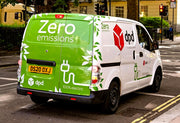The Ultimate Guide to Branded Clothing

The Ultimate Guide to Branded Clothing:
Elevate Your Brand Ethically and Sustainably
Article Overview:
- Introduction: Ethical and Sustainable Branded Clothing
- Crafting a Unique Brand Identity through Clothing
- Logo Design Strategies for Branded Apparel
- Custom Clothing and Personalisation: Your Ethical Signature
- Effective Clothing Branding Strategies
- Measuring Brand Recognition and Ethical Success
- Real-world Success Story: Bluedot Festival
- Conclusion: Your Ethical Journey to Branded Clothing Success
-
Q&A: Your Guide to Ethical and Sustainable Branded Clothing
1. Introduction: Ethical and Sustainable Branded Clothing
In a world of endless choices and ever-evolving consumer preferences, branded clothing is a potent symbol of identity, value, and distinction. Whether you are a startup entrepreneur or a seasoned business owner, you should never underestimate the power of branded clothes. It's not just about what you wear; it's about what your brand wears.
In this comprehensive guide, we invite you to embark on a journey of exploration and transformation. We'll unveil the magic that branded clothing weaves in the business world, elevating your brand to new heights. But here's the twist: we'll do it the ethical and sustainable way.
Ethical clothing and sustainable clothing are not mere buzzwords; they are the bedrock of a new era in fashion and branding. As businesses, we now have the privilege and responsibility to make choices beyond profit margins. We can weave our brand stories into fabric that reflects our values and leaves a positive imprint on the world.
This guide will delve deep into the art and science of ethical and sustainable branding through clothing. We'll explore how ethical choices influence brand perception, customer loyalty, and the bottom line. And we'll do it with a spotlight on businesses like yours, seeking to create meaningful connections with consumers who care about the world they live in.
So, join us on this journey if you're venturing into the world of branded clothing for the first time or seeking to revamp your existing brand identity. Discover how to craft a unique brand identity, create an unforgettable logo, offer ethical and sustainable personalisation, and leverage these choices to impact your brand and the world positively.
Are you ready to elevate your brand ethically and sustainably through the power of branded clothing? Let's begin.
2. Crafting a Unique Brand Identity through Clothing
Your brand identity is the heartbeat of your business. It's the intangible essence that sets you apart in a crowded marketplace. It's what customers remember when they think of your brand. And it's what defines the values and personality that resonate with your target audience.
The Role of Branded Clothing in Defining Brand Identity
Branded clothing is not just about fashion trends; it's about storytelling and creating a lasting impression. When your brand identity harmoniously weaves with the clothing you provide, it becomes a visual and emotional representation of your business. It communicates who you are, what you stand for, and why you matter.
Every element of your branded clothing, from the choice of fabrics to the design, should reflect your brand's core values and personality.
For instance, if your brand is known for eco-consciousness, your clothing should use sustainable materials and eco-friendly production processes. Your attire should exude elegance and exclusivity if you're a high-end luxury brand.
Choosing Brand Colors, Typography, and Designs
You must pay meticulous attention to detail to craft a unique brand identity. Start with the basics: colours, typography, and designs.

Colours evoke emotions and create associations. Consider the famous red of Coca-Cola or the blue of Facebook. These colour choices are not random; they're strategic. When selecting colours for your branded clothing, consider what feelings and perceptions you want to trigger in your customers.
For additional reading on colour perception, read this article:
How do people perceive traits by the colours we wear?
Typography is the visual language of your brand. Fonts have personalities, and they convey messages. For instance, a playful and rounded font may not suit a law firm's brand identity, but it could work well for a children's clothing brand.
Designs are where your brand's creativity can truly shine. Your logo, patterns, and motifs should be distinctive and instantly recognisable. They should capture the essence of your brand. For example, the Nike swoosh or bitten apple of Apple Inc. are iconic designs that transcend language and culture.

Don't forget the power of consistency when crafting your unique brand identity through clothing. Every item of clothing you offer should align with your chosen colours, typography, and designs. This consistency breeds familiarity, trust, and loyalty among your customers.
Ethical and sustainable choices in materials, production processes, and labour practices can become integral to your brand identity when choosing clothing for branding. When customers know your company's attire is made with care for the environment and respect for workers' rights, it strengthens their connection to your brand.
So, as you venture into the world of branded uniforms, remember that it's not just about what you put on the racks; it's about how you tell your brand's story through fabric and design. Craft a unique brand identity that resonates with your audience, and watch as your clothing becomes a powerful emblem of who you are and what you stand for.
3. Logo Design Strategies for Branded Apparel
Your logo is the visual cornerstone of your brand. It's the symbol that customers instantly recognise, the mark that encapsulates your identity. When it comes to branded apparel, a well-crafted logo is not just a design; it's a promise and an invitation.
Creating a Memorable Logo: The Art of Lasting Impressions
Your logo is the face of your brand, and the pursuit of a memorable logo is paramount. A memorable logo isn't just an image; it's an indelible mark that etches itself into your audience's memory. The emblem distinguishes your brand from the crowd, the symbol that endures long after the first encounter.
Memorability is the magic formula. A memorable logo ensures that your brand stays firmly imprinted in the minds of your customers. Think about logos like the intertwined rings of Audi or the colourful peacock of NBC. These logos transcend mere design and are enduring symbols defining their respective brands.

When shaping your logo, consider these critical elements for achieving memorability:
- Simplicity: Keep your design clean and uncluttered. Simplicity enhances recognition.
- Uniqueness: Your logo should possess a distinctive quality. It should set your brand apart in a crowded market.
- Relevance: Ensure your logo aligns seamlessly with your brand's message and identity. It should encapsulate the essence of what your brand stands for.
- Versatility: Your logo should look equally impressive across diverse platforms, from clothing tags to digital screens.
- Timelessness: Strive for a design that withstands the test of time. A timeless logo remains relevant even as design trends evolve.
When it comes to choosing the right approach for logo creation, you have two main options:
- Professional Designers: These experts bring a wealth of experience, creativity, and design knowledge to the table. They can effectively translate your brand's essence into a visually striking logo.
You can learn more about the benefits of hiring a professional designer in this helpful article:
5 Reasons why hiring a graphic designer will boost your brand
- DIY Logo Design: With the advent of accessible design tools, creating your own logo has become more feasible. However, it demands a solid grasp of design principles. If you opt for this route, invest time in research and learning to ensure your DIY logo leaves an unforgettable impression. You can use online apps like Canva or use our product designer tool.
Your logo represents a long-term investment in your brand's recognition and perception. Approach its creation carefully, and it will become a guiding light that leads your brand forward, making every interaction with your audience memorable.
4. Custom Clothing and Personalisation: Your Ethical Signature
Personalisation in corporate branded clothing takes on a whole new dimension when it's both ethical and sustainable. In this section, we'll explore the powerful intersection of ethical and sustainable practices with personalisation.
Discover how offering customised, eco-friendly clothing from renowned sustainable clothing brands like Continental Clothing and Stanley/Stella can become your brand's ethical signature, ultimately enhancing sales and fostering unwavering brand loyalty.
And yes, we'll also touch upon the importance of your branded clothing logo in this equation.
The Power of Ethical and Sustainable Personalisation
Personalisation isn't just about adding names or initials to garments; it's about creating a unique, tailored experience for your customers while adhering to ethical and sustainable principles.

When personalisation aligns with ethics and sustainability, it becomes a potent tool for conveying your brand's commitment to responsible practices. Your customers will not only appreciate the individualised touch but also resonate with your brand's values, fostering a deep sense of connection.
Turning Advice into Action for Your Business
To embark on this ethical journey of personalisation, let's focus on practical steps that will not only enhance your brand's ethical signature but also drive sales:
- Choose Sustainable Clothing Brands: Opt for renowned sustainable clothing brands like Continental Clothing and Stanley/Stella. These brands provide a range of eco-friendly options like organic cotton, recycled polyester, and Tencel, which have a lower environmental impact. Associating your brand with established ethical clothing brands not only ensures quality but also appeals to conscious consumers.
- Branded Clothing Logo: Ensure your logo is seamlessly integrated into your personalised clothing. This logo is your visual signature and a key element in brand recognition. Make it memorable, and it will be a powerful tool for promoting your brand.
- Leverage Local Production: Whenever feasible, consider local or domestic production. This not only reduces transportation distances but also supports local economies. Highlight the local aspect of your production process as it resonates with consumers seeking ethical choices.
- Ethical Packaging: Extend personalisation to your packaging. Use recycled and recyclable materials for shipping, and consider adding a personal touch with handwritten notes or eco-friendly stickers. This attention to detail enhances the unboxing experience, fostering brand loyalty.
- Transparent Storytelling: Communicate your ethical and sustainable practices transparently to your customers. Share your brand's journey towards sustainability and the positive impact of their choices when they opt for personalised, eco-friendly clothing. Transparency builds trust and resonates with conscious consumers.
- Collaborate with Sustainable Printing Partners: Collaborate with sustainable printing partners, such as ourselves. We share your commitment to ethical and sustainable values. By working with partners who align with your principles, you ensure that every aspect of your personalised clothing, from design to printing, adheres to the highest ethical and sustainable standards.
By implementing these practical steps, you can seamlessly integrate ethical and sustainable personalisation into your branded attire. This not only elevates your brand's ethical signature but also appeals to the growing consumer demand for responsible and personalised products.
In the world of custom clothing, ethical personalisation is not just a trend; it's a movement towards a more responsible and meaningful fashion industry. Embrace it, and watch as your customers become not just brand loyalists but also champions of your ethical and sustainable values, ultimately driving sales and business growth.
5. Effective Clothing Branding Strategies
Branding is the art of storytelling, and in the world of clothing, it's the narrative that sets you apart. In this section, we'll explore effective clothing branding strategies that can elevate your brand's presence and resonate with your target audience.

1. Define Your Unique Selling Proposition (USP).
Your Unique Selling Proposition (USP) is the foundation of your branding strategy. In the context of ethical and sustainable clothing, your USP could revolve around your commitment to eco-friendly materials, ethical sourcing, or a particular style that resonates with conscious consumers. To expand on this strategy:
- Eco-Friendly USP: If your brand places a strong emphasis on using sustainable materials like organic cotton or recycled fabrics, make this the core of your USP. Communicate the positive environmental impact of your choices to customers, emphasising that they're not just buying clothing; they're contributing to a greener future.
- Ethical Sourcing USP: If your ethical practices include fair wages and safe working conditions for garment workers, showcase this. Share stories and images of the people behind the clothes, illustrating how their lives are positively impacted by your brand's commitment to ethical sourcing.
2. Craft a Compelling Brand Story
Your brand's narrative is a powerful tool for connecting with consumers on a deeper level. In the realm of ethical and sustainable clothing, your story could emphasise your brand's mission to combat fast fashion, reduce waste, or support local communities. Expanding on this strategy:
- Sustainability Journey: Share the story of your brand's journey toward sustainability. Highlight milestones, challenges, and successes. This transparent storytelling builds trust and allows customers to feel like they're part of your mission.
- Local Community Impact: If your brand supports local artisans or communities, tell their stories. Showcasing how your business positively affects local lives can be a heartwarming and relatable aspect of your brand narrative.
3. Develop a Consistent Visual Identity
A cohesive visual identity is vital for brand recognition. Ensure that your logo, colour palette, and design elements align with your brand's personality and ethical values:
- Logo and Sustainability: If your logo includes nature-inspired elements or green imagery, it reinforces your commitment to sustainability. Ensure that your "branded clothing logo" seamlessly blends with this eco-friendly visual identity.
- Colour Choices: Use colours that evoke a sense of nature, sustainability, or ethics. Earthy tones, blues, and greens can all be associated with ethical and sustainable practices.
4. Embrace Sustainability as a Brand Value
Incorporating sustainability as a core brand value is not only relevant but also essential. Expand on this strategy by:
- Sustainability Symbols: Consider incorporating recognisable sustainability symbols, such as recycling icons or leaves, into your branding materials. These symbols reinforce your commitment to eco-conscious practices.
- Educational Content: Use your branding platforms to educate consumers about sustainability. Share tips on caring for eco-friendly clothing, explain the benefits of organic materials or discuss the impact of ethical choices in the fashion industry.
By focusing on these four key branding strategies, you can create a compelling and authentic brand identity that resonates with conscious consumers seeking ethical and sustainable clothing options.
6. Measuring Brand Recognition and Ethical Success
In the ever-evolving landscape of ethical and sustainable fashion, measuring your impact is key to thriving and growing. In this section, we'll introduce you to essential metrics for assessing brand awareness and success in the ethical and sustainable fashion realm. We'll also draw inspiration from real-world success stories, with brands like Stanley/Stella and Continental Clothing company leading the way in ethical practices.
Brand Recognition Metrics
- Social Media Engagement: Track your brand's social media engagement. Look at metrics like likes, shares, comments, and the growth of your followers. Engaged followers are a sign that your brand message is resonating and spreading.
-
Brand Mentions: Monitor how often your brand is mentioned online, in blogs, articles, and social media posts. Positive mentions and discussions about your ethical practices indicate your growing influence.
- Customer Feedback: Collect and analyse customer feedback. Positive reviews and testimonials related to your ethical and sustainable initiatives reflect your brand's reputation and impact.
Ethical Success Metrics
-
Sustainable Sourcing Metrics: Measure the percentage of sustainable materials used in your clothing production. Track improvements over time and set targets for increasing the use of eco-friendly materials.
-
Supply Chain Transparency: Assess the transparency of your supply chain. Monitor how much information you can share with customers about the journey of your products, from sourcing to production.
- Carbon Footprint Reduction: Calculate and report your carbon footprint reduction efforts. Showcase the reduction in emissions achieved through ethical practices like local production and eco-friendly materials.
7. Real-world Success Story: Bluedot Festival - Embracing Sustainability as a Brand
The Bluedot Festival, held annually at the Jodrell Bank Observatory in the UK, epitomises the fusion of music, science, and sustainability. As a beacon of innovation in event management, Bluedot has not only captured hearts with its unique blend of music and science but has also embraced sustainability as an integral part of its brand identity.

Commitment to Sustainable Clothing
One of the notable ways Bluedot has demonstrated its dedication to sustainability is through its merchandise. The festival actively chose the "EarthPositive" range of sustainable clothing from Continental Clothing for its merchandise offerings. This choice extends beyond a mere product selection; it's a conscious commitment to reduce the festival's environmental footprint.
Transparent Brand Messaging
Bluedot Festival doesn't shy away from openly sharing its ethical and sustainable choices. The festival proudly advertises its use of sustainable clothing on its website and through its active presence on social media platforms. This transparency not only builds trust with festival-goers but also serves as a shining example of how embracing sustainability can be part of a brand's public narrative.
A Holistic Approach
Bluedot Festival's dedication to sustainability goes beyond clothing. The festival has implemented eco-friendly initiatives such as waste reduction, energy efficiency, and responsible sourcing of food and beverages. This holistic approach aligns with the festival's ethos and reinforces its commitment to ethical and sustainable practices.
Inspiring Positive Change
Bluedot Festival's success story is a testament to the transformative power of sustainability in branding. By integrating sustainability into its identity and choices, the festival has not only garnered recognition but also inspired positive change within its industry.
The Bluedot Festival stands as a shining example of how brands, even in the entertainment and event sector, can lead by example in sustainability. Its dedication to sustainable clothing, transparent brand messaging, and holistic, eco-friendly initiatives showcase the potential for positive impact when sustainability becomes an intrinsic part of a brand's narrative. Bluedot Festival is not just an event; it's a catalyst for a more sustainable and responsible future.
8. Conclusion: Your Ethical Journey to Branded Clothing Success

In conclusion, this guide has illuminated the path to success through ethical and sustainable branded clothing. From forging a unique brand identity to mastering the art of logo design, ethical personalisation, and effective branding strategies, you now possess a comprehensive toolkit to elevate your brand both ethically and sustainably. By embracing ethical and sustainable branded clothing, you're not only positioning your brand for soaring success but also contributing to a positive impact on the world.
Remember, the world of custom-printed clothing is evolving, and consumers are increasingly valuing brands that prioritise ethics and sustainability. Your commitment to responsible practices, transparent storytelling, and eco-friendly choices can set your brand apart, foster deep connections with customers, and drive both brand loyalty and sales.
As you embark on your ethical journey, stay true to your values and keep measuring your impact. Just as the Bluedot Festival demonstrates, sustainability isn't just a buzzword; it's a powerful driver of change and recognition. Your brand has the potential to inspire and lead by example, leaving a lasting imprint on the fashion industry and the planet.
Embrace ethical and sustainable branded clothing, and watch your brand not only thrive but also shine as a beacon of responsible and impactful fashion. Your journey towards branded clothing success begins here, guided by ethics, sustainability, and a commitment to making a difference.
Relate Articles:
- Continental Clothing: A Journey Through Sustainability and Style
- Who is Stanley Stella: Unveiling the Ethical Fashion Pioneers
- Design Tips for Eye-Catching T-Shirt Printing in the UK
- 5 Reasons why hiring a graphic designer will boost your brand
9. Questions & Answers: A Guide to Branded Clothing
Q1: What is ethical and sustainable branded clothing, and why is it important?
A1: Ethical and sustainable branded clothing refers to garments produced and marketed with a solid commitment to ethical practices, such as fair labour conditions and sustainability, including eco-friendly materials and processes. It's important because it aligns with consumer values, reduces environmental impact, and promotes responsible business practices.
Q2: How can I choose sustainable clothing brands for my business?
A2: To choose sustainable clothing brands, research companies prioritising eco-friendly materials, ethical manufacturing, and transparent supply chains. Brands like Continental Clothing and Stanley/Stella offer sustainable options for businesses seeking ethical clothing for branding.
Q3: What is the significance of a branded clothing logo in ethical fashion?
A3: A branded clothing logo in ethical fashion visualises your brand's commitment to ethical and sustainable practices. It communicates your values and helps with brand recognition, showing customers you prioritise responsible clothing production.
Q4: What are the key elements of a successful brand identity in ethical clothing?
A4: A successful brand identity in ethical clothing should encompass a unique selling proposition (USP) that highlights your ethical practices, a compelling brand story that resonates with consumers, a consistent visual identity, and a commitment to transparency and sustainability.
Q5: How can I measure the success of my ethical and sustainable clothing brand?
A5: To measure the success of your ethical and sustainable clothing brand, track metrics such as social media engagement, brand mentions, and customer feedback for brand recognition. For ethical success, measure sustainable sourcing, supply chain transparency, and carbon footprint reduction.
Q6: Can you provide a real-world example of a successful ethical and sustainable brand?
A6: The Bluedot Festival in the UK is a prime example of a successful, ethical and sustainable brand. They actively promote their use of sustainable clothing from Continental Clothing in their merchandise, showcasing their commitment to sustainability and setting a positive example for the festival industry.
Q7: How can ethical and sustainable personalisation enhance my branded clothing business?
A7: Ethical and sustainable personalisation can enhance your branded clothing business by offering customers a unique and eco-friendly experience. It fosters brand loyalty and attracts conscious consumers who appreciate personalised, responsible products.
Q8: What are some ethical branding strategies for clothing businesses?
A8: Ethical branding strategies include defining your USP centred around ethics, crafting a compelling brand story, developing a consistent visual identity, and embracing sustainability as a core brand value. These strategies resonate with conscious consumers and differentiate your brand.
Q9: Why should my clothing brand prioritise sustainability and ethics?
A9: Prioritising sustainability and ethics in your clothing brand aligns with consumer values and positions your brand for long-term success. It reduces environmental impact, promotes ethical practices, and fosters customer trust, ultimately driving brand loyalty and sales.
Q10: How can I inspire positive change through ethical and sustainable branding?
A10: You can inspire positive change by openly sharing your brand's ethical journey, demonstrating your commitment to sustainability in your actions, and engaging with consumers on eco-friendly practices. Your brand can lead by example, encouraging others to make responsible choices.
-
Posted in
Branding, Colour, Sustainable, Uniforms









